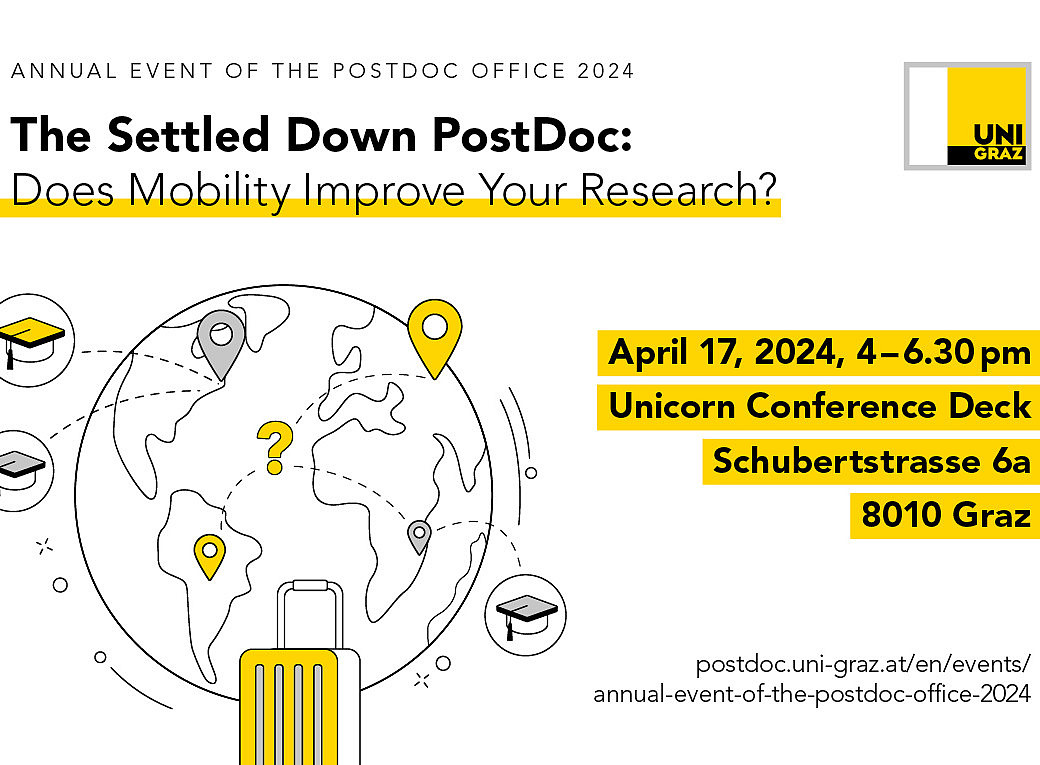This year, speakers and discussants will explore the mobility requirement for academic careers. Does the circulation of knowledge always require the physical circulation of researchers? Is changing your location and research environment always beneficial to the quality of research? Does substantial international working experience make it more likely that one will be awarded a professorship?
REGISTRATION
Recent research suggests that academic mobility can have adverse effects on individuals and exacerbate existing inequalities. It can be at odds with care obligations and intimate relationships. International researchers may be more vulnerable to power abuse. And: Native-born scholars might even be preferred for powerful positions due to homophily mechanisms, language proficiency, and local traditions in assessing research performance.
Schedule:
4pm: Welcome Interview
- Mireille van Poppel & Joachim Reidl Vice-Rector for Interationalisation and Equal Opportunities & Vice-Rector for Research, University of Graz
4.15pm: Opening Talks on Mobility & Career Success
- Academic (Im)mobility and the strive for research internationalization: Vera Axyonova Political Scientist, University of Vienna
- Angelika Sauer & Florian Holzinger: A multi-perspective take on mobility in Research and Innovation, Social Scientists at POLICIES – Institut für Wirtschafts-, Sozial- und Innovationsforschung at Joanneum Research, Vienna/Graz
5.15pm: Round Table: Does Mobility Improve Your Research - And What Are The Risks Of Mobility?
- Mónica Cano Abadía Philosopher, BBMRI-ERIC Graz
- Wolfgang E. Ernst Experimental Physicist, TU Graz
- Tea Pavkov-Keller Structural Biologist, University of Graz
- Viktorija Ratković Peace and Conflict Researcher, University of Klagenfurt
6.15pm: PostDoc Peer Mentoring Certification Ceremony
- Joachim Reidl & the members of the Peer Mentoring Team
6.30pm: End of Event
Representatives of the university's International Relations Office (BiB) will be present and can be approached to give information about expanding your network through international mobility!
As always, we expect the discussions at the Annual Event to be controversial and solution-focussed at the same time. Food & drinks will be provided throughout. Register here.
About the speakers:
Vera Axyonova: Marie Curie REWIRE Fellow at the Political Communication Research Group, University of Vienna. Co-editor of Academics in exile: Networks, knowledge exchange and new forms of internationalization (Transcript, 2022). Previously Managing Director of “Academics in Solidarity”, Freie Universität Berlin, and postdoctoral researcher in Giessen, as well as Hurford Next Generation Fellow with the Carnegie Endowment’s Euro-Atlantic Security Initiative. PhD in Political Science from Bremen International Graduate School of Social Sciences (2014).
Mónica Cano Abadía: Senior Scientist at BBMRI ERIC, expert on Ethics of Medical AI. Gender, Equality and Diversity specialist. Worked as a postdoctoral researcher in Graz and Rijeka. PhD in Philosophical Studies, University of Zaragoza, 2014 & MA in Secondary Education Teaching, University UNED 2017.
Wolfgang E. Ernst: Emeritus Professor of TU Graz since 2019. Extensive experience in academic service (e.g. Dean/Vice-Dean of the TU Faculty of Mathematics, Physics, and Geomatics), as well as extensive international board duties (e.g. Lifetime Fellow of The American Physical Society). Between 1990 and 2002 Tenured Full Professor of The Pennsylvania State University, USA. 1983 Habilitation from FU Berlin. Held previous research positions at FU, Stanford University and Rice University. Throughout his career, very active as supervisor to (international) MA students, postdocs, sabbatical guests, and short term visitors.
Florian Holzinger: Researcher with a degree in political science from the University of Vienna (2003). Since 2007 he has been working for JOANNEUM RESEARCH, POLICIES – Centre for Economic and Innovation Research, most recently in the project "GRANTeD - Grant Allocation Dispartities from a gendered perspective". Interests include influence of gender on innovation systems and on governance issues in science, technology and innovation, as well as Creative Industries and their relevance in knowledge based economies.
Tea Pavkov-Keller: Ass.-Prof. at University of Graz & project leader of “Biomolecular Structures and Interactions" (PhD training program spanning 3 universities in Graz). PhD in 2006 (Graz). Holds a Psychosocial Counselling qualification (2022) and is active in the ReMO COST Action CA19117 "Researcher Mental Health".
Viktorija Ratković: Postdoc Assistant, Department of Educational Science & Centre for Peace Research and Peace Education, University of Klagenfurt. Member of the Works Council for Academic Staff. PhD thesis on Post-Migrant Media Production published in 2018. Since 2004, she is employed at the University of Klagenfurt in research and leadership roles.
Angelika Sauer: Holds an MA in Global Studies (2018) and an MA in Economics (2013) from the University of Graz. Since 2013 she has been working for JOANNEUM RESEARCH, POLICIES – Centre for Economic and Innovation Research.
The PostDoc Office Annual Event is a yearly opportunity for open discussion of burning issues for early career researchers. It is also the space where we honor the group of researchers who took part in the PostDoc Peer Mentoring Programm. On behalf of Vice-Rector for Internationalisation and Equal Opportunities, Mireille van Poppel, and Vice-Rector for Research, Joachim Reidl, allow us to warmly invite you!
